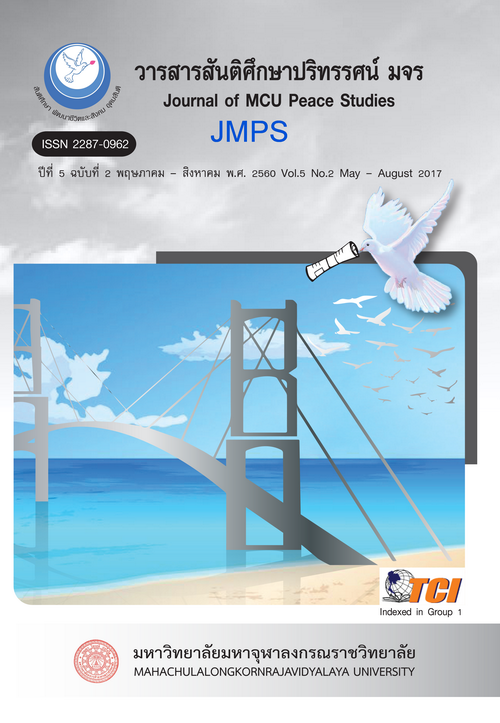The Wisdom Development Process from the Pilgrimage at the Four Main Buddhist Pilgrimage Places
Main Article Content
บทคัดย่อ
This qualitative research is of 3 objectives: 1) to study the Buddhist wisdom development process 2) to study the pilgrimage at the Four Main Buddhist Pilgrimage Places, and 3) to synthesize the wisdom development process from the pilgrimage at the Four Main Buddhist Pilgrimage Places, which its tool is aiming to study both documentation and in-depth interview with the pilgrims, religious scholars, Phra Dhammaduta, Phravidyakorn and Tour leaders. All gathered information are analyzed and synthesized to answer the objectives. The research findings are explained in descriptive essay.
The results of this research are as follows:
1) Buddhist wisdom development process begins from associating with the persons of goodwill, the listening to the good persons, the wise consideration and self evaluation within oneself and the implementing with right view.
2) The pilgrimage to the Four Main Buddhist Pilgrimage Places is important because Lord Buddha stated to Venerable Ananda that a pious disciple should visit and look upon these four places with feelings of reverence. In addition, Lord Buddha said that the pilgrim to these places, after death, will be reborn in a realm of heavenly happiness. Therefore the pilgrimage to the Four Main Buddhist Pilgrimage Places has become a continuous tradition adopted by the faithful followers. The pilgrimage to these places should be undertaken when an opportunity allows.
3) The wisdom development processes at the Four Main Buddhist Pilgrimage Places begins from associating with the good persons during the pilgrimage. Then the pilgrim should listen to the Dhamma lecture from the good persons at the actual places in Buddhist history. After that the pilgrim should contemplate the ultimate truth that gained from the Main Buddhist Pilgrimage Places which can lead to the implementing with right view.
Article Details
ทัศนะและความคิดเห็นที่ปรากฏในบทความในวารสาร ถือเป็นความรับผิดชอบของผู้เขียนบทความนั้น และไม่ถือเป็นทัศนะและความรับผิดชอบของกองบรรณาธิการ ยินยอมว่าบทความเป็นลิขสิทธิ์ของวารสาร


